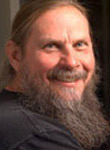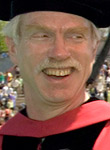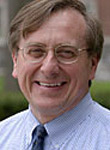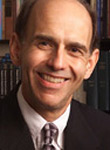Ealick, Fox, Fuchs and Ganem are elected AAAS fellows
By Lauren Gold




Four Cornell faculty members have been elected fellows of the American Association for the Advancement of Science (AAAS), the world's largest general scientific society and publisher of the journal Science.
Steven Ealick, Thomas Fox '71, Kent Fuchs and Bruce Ganem are among the 503 fellows elected in 2010. They will be recognized for their contributions to science and technology at the Fellows Forum Feb. 19 at the AAAS Annual Meeting in Washington, D.C.
Ealick, the William T. Miller Professor of Chemistry and Chemical Biology, uses X-ray crystallography to study the three-dimensional structures of proteins. The structural information is used for drug design, protein engineering, to understand catalytic mechanisms and to explore protein evolution.
His main projects include studies of enzymes involved in purine nucleotide metabolism and pyrimidine nucleotide metabolism, pathways that play a role in diseases such as cancer and viral infection. He also studies the biosynthesis of polyamines and thiamin, proteins that have been implicated in many biological processes, and synchrotron radiation and its application in macromolecular crystallography.
Ealick is also a Leukemia Society of America special fellow and recipient of a Scholar Development Award and an Office of Naval Research Young Investigator award.
Fox, professor of genetics and a member of the graduate fields of genetics and development and of biochemistry, molecular and cell biology, joined Cornell in 1981 and specializes in mitochondrial molecular genetics and metabolism.
His research seeks to uncover how expression of genes in mitochondrial DNA is controlled by nuclear genes, and how proteins coded by mitochondrial DNA are assembled with proteins coded by nuclear DNA. Fox uses budding yeast (Saccharomyces cerevisiae) as a model system to study these interactions, since mutations can be isolated and manipulated in both the nuclear and mitochondrial genomes.
Fox has received a Dupont Young Faculty award, a Research Career Development Award from the National Institutes of Health and the State University of New York Chancellor's Award for Excellence in Teaching.
Fuchs, Cornell provost and professor of electrical and computer engineering, was recognized for his contributions to the field of computer engineering. His research interests include dependable computing and failure diagnosis of integrated circuits.
Fuchs served as the Joseph Silbert Dean of Engineering at Cornell from 2002 to 2008. Under his guidance, the college formed a new Department of Biomedical Engineering, revised the undergraduate curriculum with new undergraduate majors and graduate programs, created a teaching excellence institute, and established engineering programs and partnerships around the world.
Fuchs is also a fellow of the Institute of Electrical and Electronics Engineers and the Association of Computing Machinery.
Ganem, the Franz and Elisabeth Roessler Professor of Chemistry and Chemical Biology and the J. Thomas Clark Professor of Entrepreneurship and Personal Enterprise, joined the Cornell faculty in 1974 and specializes in synthetic organic chemistry. His research focuses on developing innovative strategies for the design and development of new multicomponent reactions (MCRs), processes in which three or more reactants combine to form a product that incorporates structural features of each. MCRs play a key role in the development of new methodology for pharmaceutical and drug discovery research.
Among many other honors, Ganem was a 2008 Stephen H. Weiss Presidential Fellow and recipient of the American Chemical Society's 2007 Award for Creative Invention; the latter for developing a new method to synthesize the powerful cancer drug paclitaxel. He is active in Cornell's entrepreneurship program, holds multiple patents and is founder or co-founder of several biopharmaceutical and biotech companies.
Get Cornell news delivered right to your inbox.
Subscribe